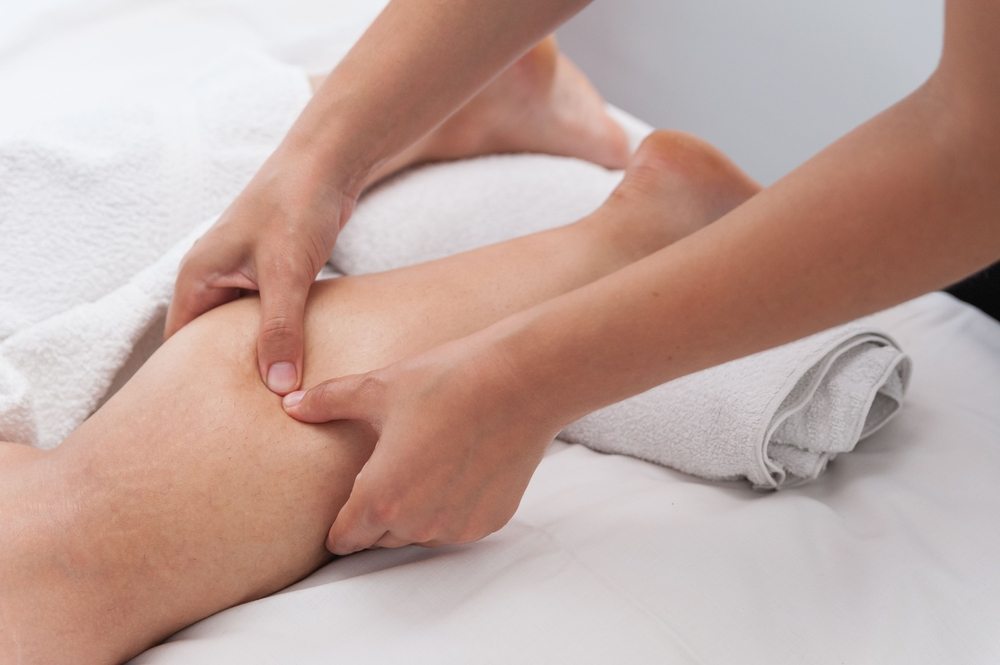Massages Keep Me Grounded in My Body
Written by |

I’ve done some arguably ridiculous things over the past two decades in the name of health. I’ve had metal rods surgically implanted in my back to keep my spine from curving. I’ve had tubes shoved up my nose and down my throat. I’ve driven to the emergency room at 11 p.m. because my service dog accidentally ripped my feeding tube out. I’ve had doctors and nurses spend literal hours on my body in search of a suitable vein. But having a massage therapist come to my house on a chilly Wednesday afternoon has to be up there on my list of unique medical experiences.
Granted, getting a massage isn’t all that weird. People get massages all the time; my dad has been seeing a chiropractor every few months for years now. It was inviting this near-stranger into my home that took me off guard. Lying on my side in front of her, my space heater buzzing on the other side of the room, my laptop pinging every time I got a text. She applied gentle but insistent pressure to the base of my skull, and I tried rather valiantly to stay awake and keep from drooling all over my pillow.
Join our forums and be part of the SMA News Today Community!
I’m not touched very often. I say that as someone who is, admittedly, tactile by nature. I love holding hands, giving hugs, feeling the people I love — letting the people I love feel me. But people don’t touch me very often. I came to terms with it long ago when I first realized that I’m different, that my body doesn’t function like everyone else’s. The older I get, the more obvious it becomes. These days, one look is all it takes. There’s my wheelchair, yes, but also my hands, gnarled little fists with fingers curled tightly against my palms; my rib cage, jutting out at awkward angles; my head, misshapen after years of being supported by my headrest.
I’ve learned to ignore my body. To forget that it exists. I don’t exercise, don’t walk or run or do yoga, so most days I just … sit. My body isn’t beautiful. There’s nothing sexy about it, or poetic, or magical. My body is a body. It gets me from place to place. On bad days, it itches and aches, stings and throbs; on good days, it does what I tell it to, holding off on pain until I crawl in bed at night.
These tension headaches have thrown a wrench in things. I can’t just ignore my body anymore, because my body is the crux of it all. When everything’s in balance, when I’m hydrated and well-rested and full of vitamins, the headaches disappear. I have to listen to what my body is telling me, extrapolate from not enough sets of data. Is it a tension headache or a menstrual headache? Have I been eating healthily? Is my pillow flat? Am I holding tension in my body throughout the day? Are my glasses sitting too high up on the bridge of my nose?
I’ll be honest: It’s been hard, coming to terms with a body I’ve been socialized to ignore. On my side in bed, afternoon light falling soft and warm over my body, a stranger touching parts of me, I’ve tried to forget. It’s hard. It’s easier to pretend my body isn’t there. But easier isn’t always better.
I’m tactile by nature, and yet, paradoxically, I don’t like being touched. Or maybe it’s more accurate to say I don’t like being reminded of my body. I don’t like getting massages, because massages mean all the different parts of me coming to life. But it’s better this way, I think. Better to hurt than to starve myself of touch. I have to believe that.
***
Note: SMA News Today is strictly a news and information website about the disease. It does not provide medical advice, diagnosis, or treatment. This content is not intended to be a substitute for professional medical advice, diagnosis, or treatment. Always seek the advice of your physician or other qualified health provider with any questions you may have regarding a medical condition. Never disregard professional medical advice or delay in seeking it because of something you have read on this website. The opinions expressed in this column are not those of SMA News Today, or its parent company, Bionews Services, and are intended to spark discussion about issues pertaining to spinal muscular atrophy.





Leave a comment
Fill in the required fields to post. Your email address will not be published.